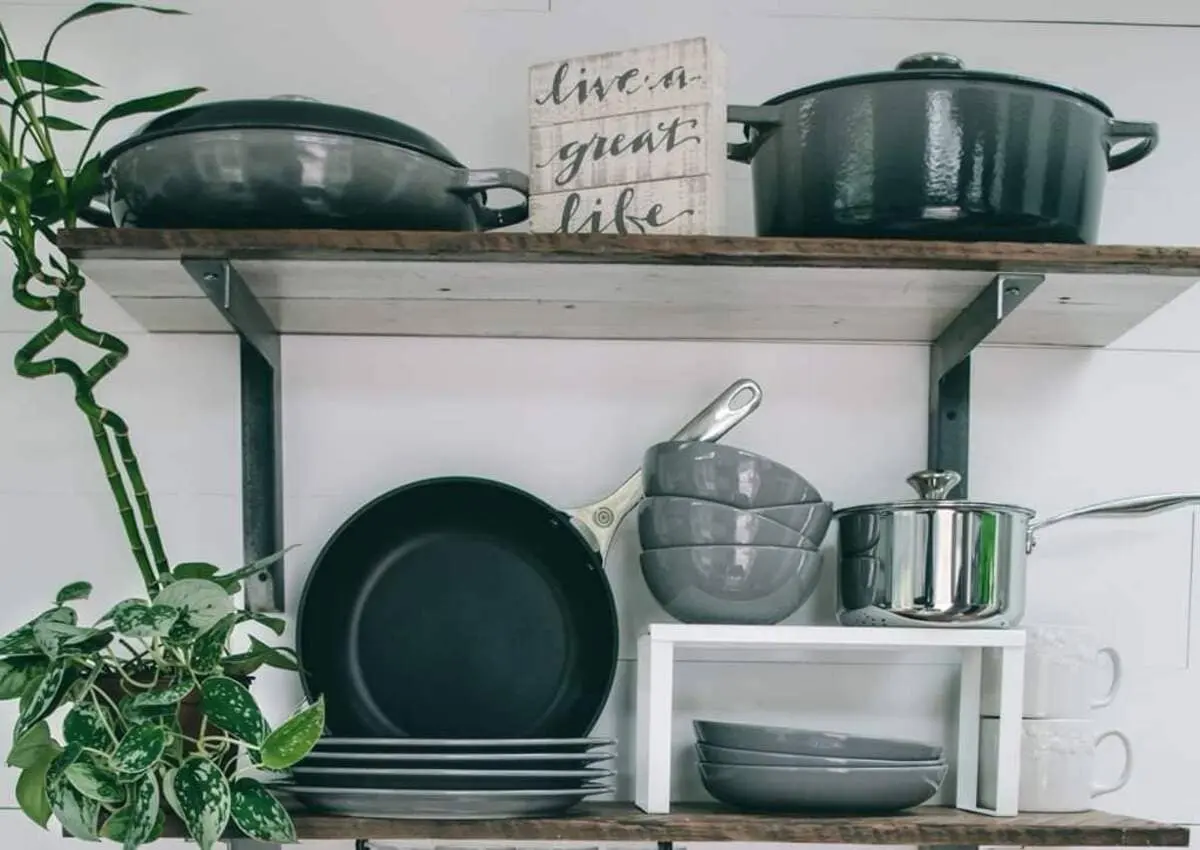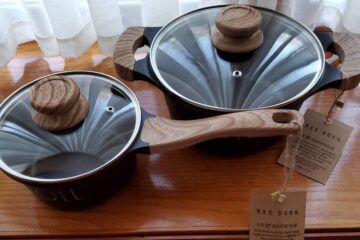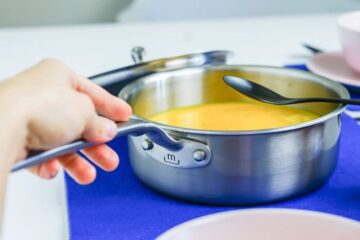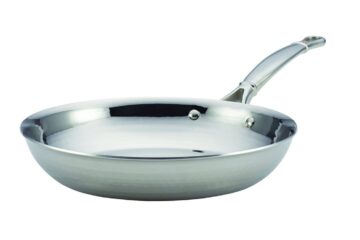Cookware and metal utensils are essential kitchen tools that make cooking easier and more enjoyable. However, with the increasing number of materials used in cookware today, it can be challenging to determine which cookware is safe for use with metal utensils.
Metal utensils can scratch or damage some cookware surfaces, releasing harmful particles into your food and causing the cookware to lose its nonstick properties. So, what cookware is safe for metal utensils?
As experts in cookware, we have done the research and are ready to share our recommendations on the best cookware materials that are safe for use with metal utensils. Whether you’re a professional chef or a home cook, this article will provide the information you need to make informed decisions about the cookware you use in your kitchen. From hard-anodized aluminium to cast iron, we’ll cover the pros and cons of various cookware materials and help you determine which is right for you.
What Is Meant By “Safe For Metal Utensils?”
When a product is labeled as “safe for metal utensils,” the material used to make the product will not react with or damage metal utensils such as spoons, forks, and knives. This is important because some materials can react with metal, causing corrosion or discoloration, or in some cases, even leaving metal particles in the food.
For example, some nonstick cookware is made with a coating that is not safe for metal utensils, and it is recommended to use plastic or silicone utensils to prevent damage to the coating. On the other hand, stainless steel cookware is typically safe for use with metal utensils.
How To Tell If Your Cookware Is Safe For Metal Utensils?
To determine if your cookware is safe for use with metal utensils, you can look for a few different indicators:
Material
Some cookware materials, such as nonstick and cast iron, are typically safe for use with metal utensils. However, others, such as aluminum and copper, can be easily scratched or damaged by metal utensils, potentially releasing harmful substances into your food.
Manufacturer’s Recommendations
Check the manufacturer’s instructions or website for recommendations on what utensils are safe to use with your cookware.
Scratch Test
You can perform a scratch test on the surface of your cookware to determine its durability. Use a metal utensil, such as a fork or spoon, to make a scratch on the surface. If the scratch leaves a noticeable mark, likely, the cookware is not safe for use with metal utensils.
Visual Inspection
Inspect the surface of your cookware for any visible signs of damage, such as scratches, dents, or chips. These can weaken the surface and make it more susceptible to damage from metal utensils.
What Cookware Is Safe For Metal Utensils?
Stainless steel, cast iron, and hard-anodized aluminum cookware are safe for use with metal utensils. Avoid using metal utensils on nonstick and ceramic cookware as they can scratch the surface and damage it over time. Always check the manufacturer’s instructions before using metal utensils on new cookware.
Which Metal Is Best For Cooking Utensils? Why?
The best metal for cooking utensils depends on the intended use, as different metals have different properties that make them better suited for specific tasks. Here are some of the most commonly used metals for cooking utensils and why they are well-suited for those purposes:
Stainless Steel
This is a popular choice for cooking utensils because it is durable, non-reactive, and easy to clean. It is also a good conductor of heat, so it heats up evenly.
Cast Iron
Cast iron cookware is heavy but retains heat well and is great for high-heat cooking such as searing, grilling, and frying. Cast iron cookware can also be seasoned to develop a nonstick surface, which makes it ideal for cooking delicate foods.
Aluminum
Aluminum is lightweight and a good conductor of heat, making it ideal for frying pans and sauté pans. It heats up quickly and evenly, which makes it well-suited for cooking delicate foods. However, aluminum can react with acidic foods, so it is not recommended for cooking tomato-based sauces or other acidic dishes.
Copper
Copper is an excellent conductor of heat and is often used in high-end cookware. It heats up quickly and evenly, making it ideal for delicate tasks like sauce. However, copper is expensive and requires frequent polishing to maintain its shiny appearance.
What Nonstick Cookware Is Metal Utensil Safe?
Most modern nonstick cookware is safe to use with metal utensils. However, using silicone, wood, or nylon utensils with nonstick cookware is still recommended to prevent scratches on the nonstick surface. Some high-end nonstick cookware brands, such as All-Clad, claim their products are safe to use with metal utensils. Other brands, such as Teflon, recommend against using metal utensils to extend the life of the nonstick coating.
Is There A Nonstick Pan You Can Use Metal Utensils?
Yes, nonstick pans are safe to use with metal utensils. Some nonstick cookware is made with reinforced coatings designed to be scratch-resistant and able to withstand metal utensils without damaging the surface.
However, it’s always a good idea to check the manufacturer’s instructions or recommendations to ensure that your nonstick pan is safe to use with metal utensils. To prolong the life of your nonstick cookware, it’s also best to use silicone, wooden, or nylon utensils instead of metal ones.
What Pans Are Safe To Use Metal Utensils?
The safety of using metal utensils in pans depends on the pan and metal utensil type. Generally, pans with a hard-anodized surface or those made of stainless steel, cast iron, or titanium are safe with metal utensils.
However, pans with a nonstick coating should not be used with metal utensils as they can scratch the surface and potentially release harmful chemicals into your food. Additionally, pans with a soft surface, such as aluminum or copper, can be easily damaged by metal utensils, resulting in scratches and a shortened lifespan for the pan.
Can I Use Metal Utensils On Stainless Steel Cookware?
Yes, you can use metal utensils on stainless steel cookware. Still, it’s recommended to use utensils made of materials that are less likely to scratch the surface, such as silicone, wood, or nylon. Using metal utensils can cause scratches on the surface of your stainless steel cookware, which can lead to discoloration and damage to the protective layer that prevents corrosion.
What Pans Should I Stay Away From?
It depends on what type of cooking you plan to do and personal preferences and concerns, such as health and environmental impact. Here are some general guidelines for types of pans to avoid or be cautious of:
Nonstick pans
Some nonstick pans can emit harmful fumes when heated, especially when scratched or damaged. Avoid using nonstick pans made with PFAS (per- and poly-fluoroalkyl substances), PFOA (perfluorooctanoic acid), or GenX chemicals.
Aluminum pans
Aluminum can react with acidic foods and cause a metallic taste. If you choose to use aluminum pans, look for those made with anodized aluminum, which has a harder, more durable surface that is less likely to react with food.
Cast iron pans
Cast iron pans can be heavy and difficult to handle, especially for those with wrist or hand issues. They also require special care and maintenance to prevent rusting.
Copper pans
Copper pans can react with acidic foods, discoloring the food and giving it a metallic taste. Copper pans also require special care to prevent discoloration and maintain their shiny appearance.
- What Is Marble Coating Cookware? (Is It Safe To Use)
- Can You Use Induction Cookware On Electric Stove?
Overall Thoughts
So, that’s the expert’s take on metal utensils in cookware. What do you think of these findings? Are you surprised by any of them? How do you handle this situation in your kitchen? Be sure to let us know in the comments below!
Frequently Asked Questions
Can You Use Metal Utensils With Calphalon?
Yes, metal utensils can be used with Calphalon cookware. However, using non-abrasive utensils is recommended to prevent scratching and damage to the surface.
Can We Use Steel Spoons On Non-Stick Pans?
Yes, you can use steel spoons on nonstick pans, but it is not recommended as it may scratch or damage the nonstick surface. It is better to use plastic or silicone utensils to preserve the integrity of the nonstick coating.
What Utensils Should Not Be Used In A Nonstick Pan?
Utensils made of metal or sharp materials, such as metal spatulas, forks, or whisks, should not be used in a nonstick pan. This is because they can scratch or damage the nonstick coating, reducing its effectiveness and causing it to deteriorate over time. It’s best to use silicone, plastic, or wood utensils.
Can You Use Metal Utensils On Granite Stone Cookware?
Yes, you can use metal utensils on granite stone cookware. Still, it is recommended to use silicone or wooden utensils to avoid scratching the surface.
Can You Use Metal Utensils On Stainless Steel?
You can use metal utensils on stainless steel cookware. However, it’s best to avoid using metal utensils that are too rough or have sharp edges, as they may scratch the stainless steel surface. This can lead to discoloration and damage to the protective layer of the cookware. Instead, opt for utensils made of silicone or plastic, which are gentle on the surface and won’t scratch.
What Cookware Is Safe To Use?
Stainless steel, cast iron, and ceramics are safe for cooking as they are non-toxic and do not contain harmful chemicals. Avoid using aluminum and nonstick cookware as they can leach harmful chemicals into food.
What Metals Are Safe To Cook On?
Safe metals for cooking include stainless steel and cast iron. Both are durable, non-reactive, and do not leach harmful chemicals into food. They are also good heat conductors, making them ideal for cooking.



